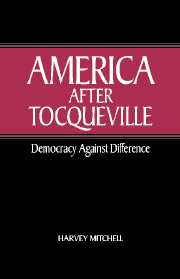Book contents
- Frontmatter
- Contents
- References to Tocqueville's Democracy in America
- Preface
- I PATHS TO DEMOCRACY IN AMERICA
- II BEGINNINGS AND DEMOCRACY
- III AMERICAN DEMOCRACY ON TRIAL
- 7 Difference, Race, and Color in America
- 8 Maintaining American Democracy
- 9 The State, Authority, and the People
- 10 Conclusion
- Works Cited
- Index
9 - The State, Authority, and the People
Published online by Cambridge University Press: 10 August 2009
- Frontmatter
- Contents
- References to Tocqueville's Democracy in America
- Preface
- I PATHS TO DEMOCRACY IN AMERICA
- II BEGINNINGS AND DEMOCRACY
- III AMERICAN DEMOCRACY ON TRIAL
- 7 Difference, Race, and Color in America
- 8 Maintaining American Democracy
- 9 The State, Authority, and the People
- 10 Conclusion
- Works Cited
- Index
Summary
As we have seen in the last chapter, and earlier in Chapter 3, liberal and democratic thinking places civil society at the very center of democracy and the state at its margins, as if an opposition between them forges the dynamic that ensures its health and survival. There is a long theoretical history, we may also remember, behind these suppositions, much of it brought to life for Americans by the end of the dictatorship-regimes of east and east-central Europe in and after 1989, earliest in Czechoslovakia, Hungary, Poland, and more recently in the former Yugoslavia. But American pluralistic resistance against the power of the state has its own paternity, notably through the action, as Tocqueville believed, of its voluntary associations, and the implementation of the constitutional division of powers, which he saw as the liberal institutionalization of the intermediary powers needed to check the sovereign state. There is some hint in this Tocquevillian formulation, a formulation that is de rigueur among conservative liberals, that a different picture might arise through a theory that fused civil society and state and ended the dichotomy. While Tocqueville spent some time on the possibility of a decline in the effectiveness of the tripartite separation of powers, and gave even less time to the power of organized interests, his concentration was on how the contradictory impulses of Americans who cherished liberty but demonstrated an equal need for guidance could almost involuntarily create the conditions for democratic despotism.
- Type
- Chapter
- Information
- America after TocquevilleDemocracy against Difference, pp. 242 - 275Publisher: Cambridge University PressPrint publication year: 2002



